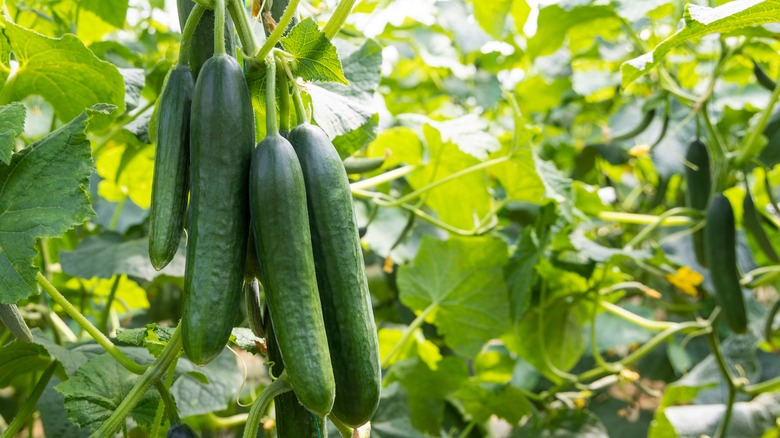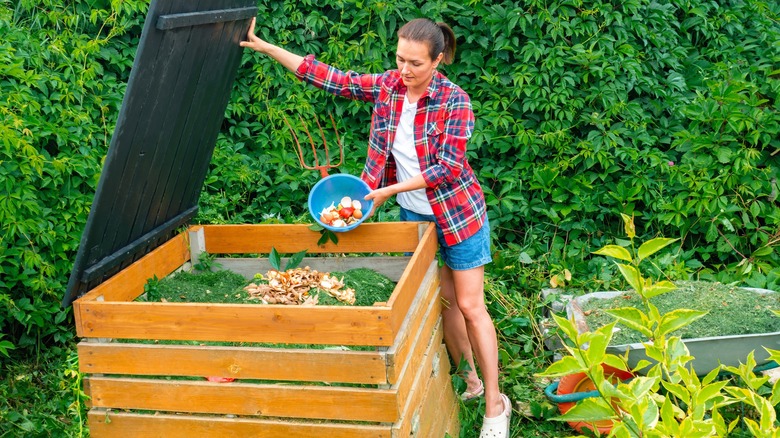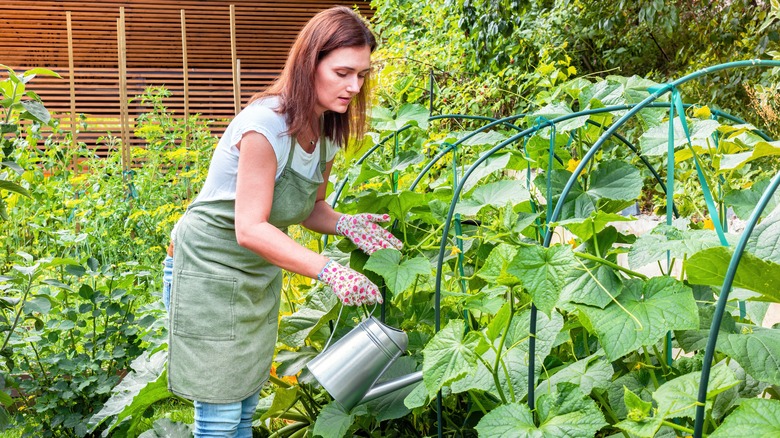Will Coffee Grounds Help Your Cucumber Plants? Here's What You Need To Know
Introducing cucumber plants to your garden is an ideal way to begin growing your own food. This nutrient-dense vegetable is great to have on hand to add to salads and snack on throughout the day. If you have cucumber plants or plan on adding them, you might be in search of tips for growing a healthy garden. As a result, you may have come across recommendations to add coffee grounds to the soil around your cucumbers. Some gardeners believe the grounds provide the plants with vital nutrients. However, Deanna Talerico, garden educator and creator of Homestead and Chill, shared that coffee grounds actually do not have this effect on cucumber plants. "No, adding coffee grounds to your soil won't help cucumbers thrive in any significant way," she told House Digest exclusively in an interview.
Rather than reaching for these grounds to help your cucumber plants thrive, consider using more reliable alternatives. According to Talerico, this includes compost, worm castings, compost tea, and slow-release organic fertilizer. These options are more likely to produce the results you are looking for. Sure, it might seem convenient to dump your coffee grounds into your cucumber plant's soil to give them a boost of nutrients. However, this simply won't do much.
Coffee grounds offer minimal nutrients for cucumber plants
Talerico shared more information on why this popular tip is not actually effective. According to the expert, one of the problems with coffee grounds is that many potential benefits for soil are depleted after they are brewed. "First of all, raw coffee grounds are fairly acidic, but most people aren't putting perfectly good unused coffee into their garden — especially not the volume you'd need to actually alter the soil pH," Talerico explained exclusively to House Digest. "Once brewed, spent coffee grounds are only very mildly acidic (6.5 to 6.8 pH) or even close to a neutral pH (7)."
Beyond that downside, coffee grounds are not as nutrient-dense as alternatives that actually work. "Furthermore, coffee grounds offer only trace amounts of nutrients to help plants grow," Talerico shared, adding that cucumbers typically have no problem growing in a variety of soil pH levels. "So, manipulating the soil acidity shouldn't be the primary focus to grow healthy, productive cucumbers," she explained. All in all, there are better ways to use coffee grounds around the home.
Coffee ground alternatives that produce better results
Clearly coffee grounds are not going to determine whether your cucumber plants are healthy and crisp. Thankfully though, Talerico shared a few other options that will help the plants thrive. "Instead of fussing with coffee grounds, amend soil with organic matter (such as well-aged compost or worm castings) before planting, and then feed the plants with compost tea and/or a side-dressing of slow-release organic fertilizer halfway through the growing season," she explained while speaking exclusively to House Digest. You might also want to consider creating a loose and well-draining soil mixture for your cucumber plants, as this will aid in their health as well. "So, working potting soil, horticultural sand, or compost into heavy or compact soils will also help," Talerico explained.
Now that you are aware of some of the alternatives to coffee grounds that will actually benefit your cucumbers, you may also want to pay attention to your watering schedule. This is incredibly important when it comes to cucumber plants. "Cucumbers thrive with consistent moisture, so developing a regular watering schedule is key," Talerico shared. "Try to provide deep, routine water in a way that keeps the soil damp (but not soggy) at all times. Add a couple inches of natural mulch around the base of the plants to reduce evaporation and keep the soil more evenly moist." Talerico mentions an automated drip irrigation system makes consistent watering easier, so it may be worth it to install one.


